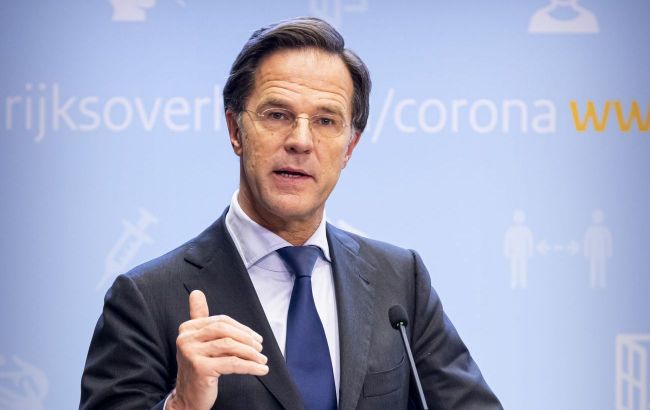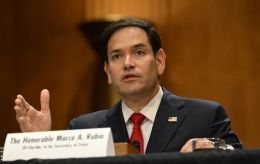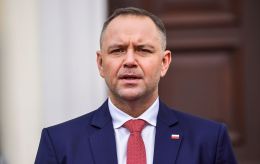'New blood' for NATO: Top 5 challenges for future Secretary General Rutte and what Ukraine can expect
 Photo: Future NATO Secretary General Mark Rutte (Getty Images)
Photo: Future NATO Secretary General Mark Rutte (Getty Images)
The next NATO Secretary General will be the current Prime Minister of the Netherlands, Mark Rutte. The final decision is expected to be made at the July summit in Washington.
For more on how Rutte reached this new position, the challenges he will face, and what Ukraine expects from him, read the material by RBC-Ukraine.
Contents
- How Mark Rutte became the NATO Secretary General
- Top 5 challenges according to Politico
- What does Ukraine expect from Rutte as NATO Secretary General
How Mark Rutte became the NATO Secretary General
Mark Rutte will become the Secretary General of NATO after Jens Stoltenberg's term concludes in October. This decision is the result of prolonged negotiations among the Alliance members.
In July 2023, Rutte announced his intention to resign after 13 years as Prime Minister. By then, he had become the longest-serving head of government in Dutch history and even mentioned his plan to leave politics altogether.
This decision was because Rutte's liberal-conservative People's Party for Freedom and Democracy considered his approach to asylum seekers too lenient. This led to the collapse of the four-party coalition, followed by early elections and the victory of the far-right populist Geert Wilders.
However, complex government negotiations dragged on, and Rutte has remained in office for almost a year. It seems his retirement plans have been indefinitely postponed, writes DW.
In October of last year, Rutte indicated his interest in succeeding Jens Stoltenberg as NATO Secretary General. Over the following months, he campaigned to win the support of his NATO allies. He quickly secured backing from the United States, followed by most other NATO member countries.
It took more time to "win" over Hungarian Prime Minister Viktor Orban, with whom Rutte had a strained relationship. To gain Hungary's support, Rutte promised that Budapest would not need to participate in NATO's military support activities for Ukraine.
Rutte is known for his good sense of humor and wit. As Prime Minister, he often commuted by bicycle and occasionally showcased his musical talent by playing the piano at The Hague's Central Station.
As NATO Secretary General, he will likely need to adopt a more serious and diplomatic demeanor. His main task will be to balance the interests of the Alliance's 32 members, notes DW.
On Tuesday, Rutte received the support of Hungary and Slovakia. Today, his last competitor, Romanian President Klaus Iohannis, announced that he was no longer vying for the position. This means that the final decision on the new Secretary General is likely to be confirmed at the anniversary summit in Washington, scheduled for July.
Top 5 challenges according to Politico
When Mark Rutte moves to NATO's Brussels office, he won't have a "honeymoon period," writes Politico. He is skilled at finding consensus and shows determination in supporting Ukraine, but even for an experienced politician, a high position in the Alliance will not be an easy ride.
The authoritative news agency lists the top 5 challenges he will have to deal with.
Possible return of Donald Trump
Rutte will assume the NATO Secretary-General position on October 1st, just weeks before the US presidential elections, where Donald Trump could potentially win—a well-known skeptic of the Alliance.
Trump has threatened to cut American aid to Ukraine. If he succeeds, it would deal a blow to allies' promises to support Ukraine in defending against Russian aggression, as Washington remains the largest donor of military assistance to Kyiv. His victory would also likely derail NATO's plan to prepare Ukraine for future membership.
Allies in 2023 pledged to invite Ukraine to join the Alliance when there is consensus. Judging by Trump's recent comments about President Volodymyr Zelenskyy, this support appears precarious. Last week, Trump remarked that Ukraine's requests for assistance supposedly "will never end."
Putin's winter campaign in Ukraine
In recent months, Russia has intensified attacks on critical infrastructure in Ukraine. This strategy is not new, as the winter of 2022-2023 also saw strikes on the energy system. According to Stoltenberg, to counter this, Ukraine needs more air defense systems.
NATO countries are working on deliveries, and in Rutte's case, the Netherlands has supplied one Patriot system and is assembling another. However, there are fewer available air defense assets in Europe now, and countries bordering Russia are not willing to give up their air shields, as noted by Politico.
Forcing NATO members to pay
The Netherlands has just achieved the target of spending 2% of GDP on defense. Currently, 23 out of 32 allies meet this requirement. However, a third of members still haven't despite promises made a decade ago.
Countries in Southern Europe are primarily lagging behind. Italy, according to forecasts, will reduce its spending from an already low 1.5% of GDP last year to just 1.28% by the end of 2024. Portugal spends 1.55%. Additionally, Canada spends around 1.37%.
Discontent from the Eastern flank
Countries bordering Russia are not the biggest supporters of Rutte. They have criticized the Netherlands for low defense spending and the louder voices of Western and Northern European countries.
Estonia's Prime Minister Kaja Kallas withdrew from the race for NATO Secretary-General after being informed that she would not have the support of the United States, France, and Germany. Romania's President Klaus Iohannis received support only briefly and tactically from Hungary.
Countries from the eastern flank will likely demand better representation. For instance, they may push for positions such as Deputy Secretary-General and various assistant roles. Pressure is expected to be exerted on Rutte to appoint someone from Eastern European countries.
European "Putin admirers"
Rutte will have to convince not only Trump of NATO's viability if he wins the US elections. Throughout Europe, right-wing parties skeptical of the Alliance and sympathetic to Vladimir Putin are gaining ground.
France is on the brink of parliamentary elections that could see significant gains for the far-right National Rally. Rutte is familiar with such scenarios, having himself to some extent campaigned for the NATO Secretary-General position after losing ground to right-wing parties in the Netherlands.
What does Ukraine expect from Rutte as NATO Secretary General
Ukraine is hopeful for further cooperation and integration into NATO.
In February, President Volodymyr Zelenskyy met him on the sidelines of the Munich Security Conference. He wished him luck and stated that he would demand a response from Rutte to a difficult question.
"We will have a strong relationship, and Mark will have to answer a difficult question from Ukraine if he becomes NATO Secretary General – and I hope he will. This question is (about granting-ed.) an invitation for Ukraine to join NATO," he said, adding that he expects concrete steps.
He also noted that he knows Rutte well and is confident that he will maintain NATO's unity.
Chairman of the Verkhovna Rada Committee on Foreign Policy Oleksandr Merezhko sees a positive aspect in Mark Rutte replacing Jens Stoltenberg.
"Being the Prime Minister of the Netherlands, he has established himself through actions and statements as a reliable partner and supporter of aid to Ukraine. At the same time, as the new NATO Secretary General, he may face new challenges related to potential changes in Washington (such as the possible election of Trump). He will have to uphold transatlantic solidarity and demonstrate, if there is a new US president, that NATO remains a crucial element of US and European security," he commented to RBC-Ukraine.
The interlocutor expects Rutte to continue Stoltenberg's line in uniting NATO allies around military assistance to Ukraine.
"Although it will not be easy, given the many changes and signs of escalating global conflict. The situation in Europe is worsening, as are the Middle East and the Asia-Pacific region. But I hope he continues Stoltenberg's policy because Ukraine has no other option," he noted.
Overall, expectations are certainly positive. Rutte has repeatedly proven himself dependable. He has done a lot for Ukraine, taking a decisive stance, and agreeing to supply F-16 jets was a significant step when it wasn't in trend.
"And I hope he continues to actively support Ukraine's NATO membership as quickly as possible," added Merezhko.
Chair of the Ukrainian delegation to the NATO Parliamentary Assembly Yehor Chernev emphasizes that Rutte was chosen primarily for his leadership qualities. But it's important for us that the Secretary General position is held by someone with a pro-Ukrainian stance, who understands clearly what is happening in Ukraine.
"I think this is a very good choice for our partners and for Ukraine. He will continue Stoltenberg's line, whose view on Ukraine's future in NATO changed significantly after Russia's full-scale invasion. It's also a plus that he brings 'new blood.' Rutte is ready for this position, he wants to be in this position. Therefore, I hope the ideas of his predecessor will be even more energetically implemented," Chernev noted.
Sources: materials from DW, Politico, comments from Oleksandr Merezhko, Chairman of the Verkhovna Rada Committee on Foreign Policy, and Yehor Chernev, Chairman of the Permanent Ukrainian Delegation to the NATO Parliamentary Assembly.

